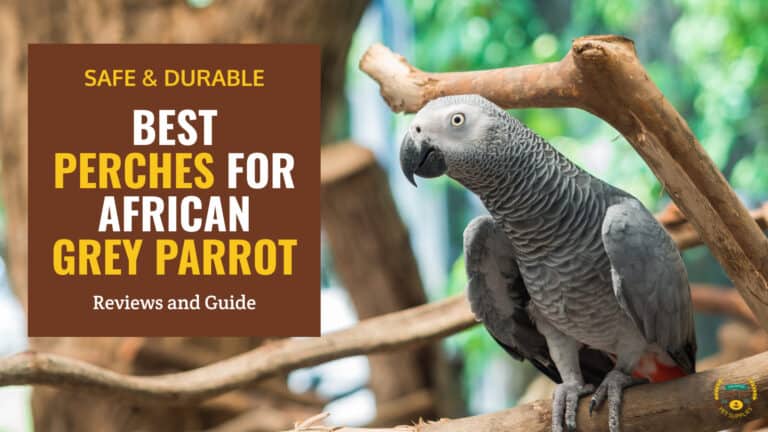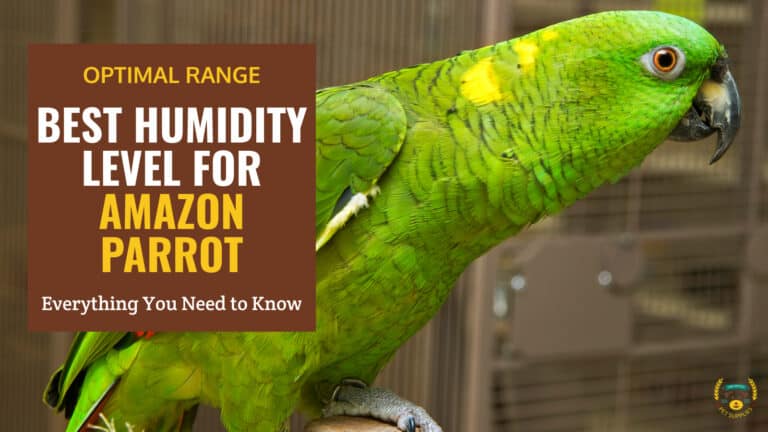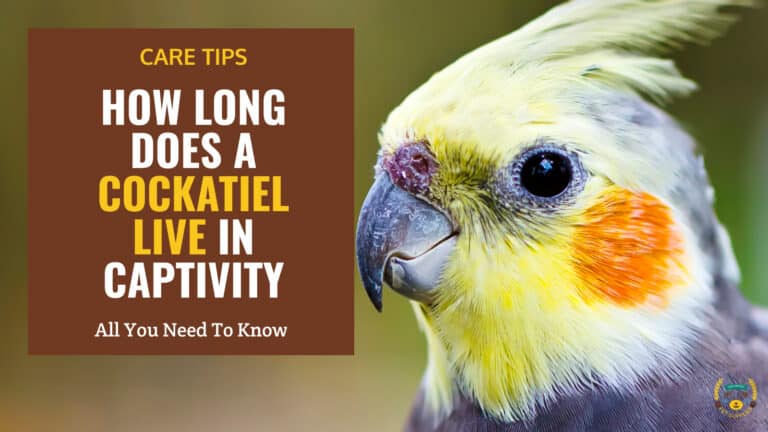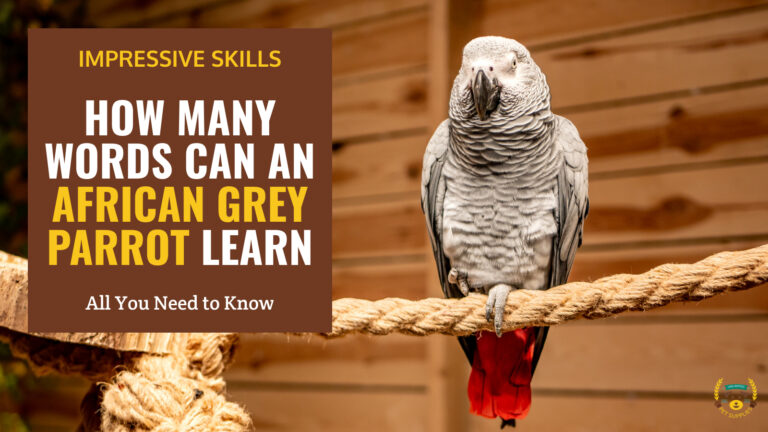Can African Grey Parrots Understand What They Say?
Last updated: February 3, 2024
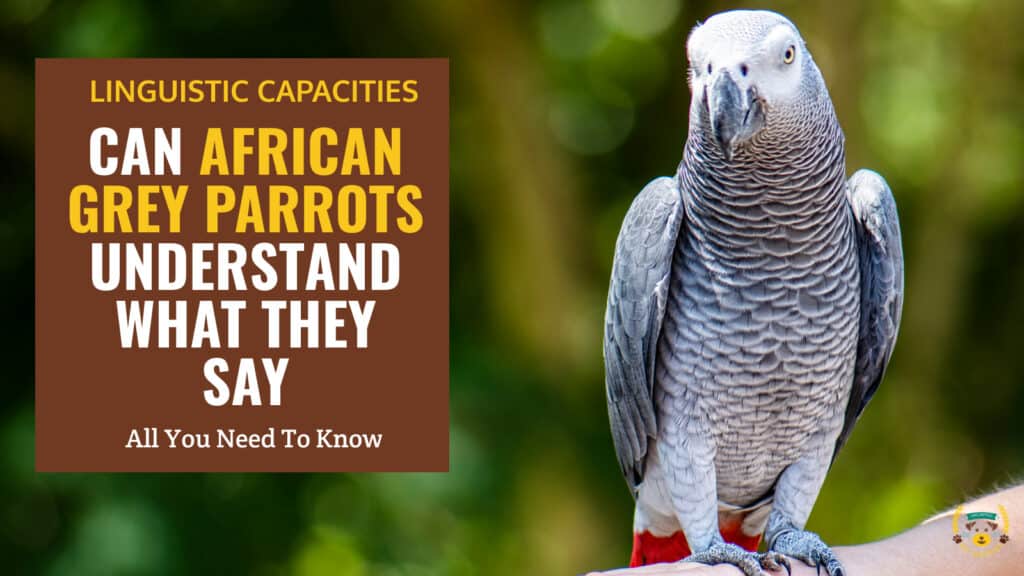
Summary
- African Greys mimic human speech remarkably, but understanding remains debated.
- Large vocabularies (1000+ words), forming simple phrases in context.
- Debate: true comprehension or mimicry without meaning.
- Grasp basic concepts (colors, shapes), but lack true grammar and complex conversations.
- More research needed to understand African Greys' language abilities.
The African grey parrot is renowned for its exceptional ability to mimic human speech, but does this skill mean the African grey actually understands language?
This article explores the linguistic capabilities of these parrots. We provide background on the African grey's innate vocal learning that enables them to imitate novel sounds from a young age. Some individuals develop a vocabulary of over 1,000 words and combine them into sentences.
However, cognitive scientists debate whether African greys merely mimic meaningful sound patterns or grasp concepts like shapes, colors and quantities. We will examine scientific evidence and controversies surrounding their verbal abilities.
The article aims to explore the depths of African greys' linguistic capacities. Their vocal skills fascinate millions yet hide unsolved mysteries. We hope to provide a balanced perspective on the evidence behind the apparent verbal abilities of these brilliant birds.
- 1) Origins and Background on African Greys
- 2) Documented Examples of Advanced Vocal Skills
- 3) Understanding vs. Mimicry: The Current Scientific Debate
- 4) Evidence For and Against Language Comprehension
- 5) Teaching African Greys: Implications for Owners
-
6)
Frequently Asked Questions
- 6.1) How large of a vocabulary can African greys learn?
- 6.2) Can African greys really use language contextually?
- 6.3) Are there examples of African greys engaging in two-way communication?
- 6.4) Do African greys understand the human speech they mimic?
- 6.5) How can owners best communicate with their African greys?
- 6.6) How do African greys compare to other parrot species in terms of intelligence and speech?
- 6.7) Why can't researchers definitively determine if African greys understand language?
- 7) Final Thoughts
Origins and Background on African Greys
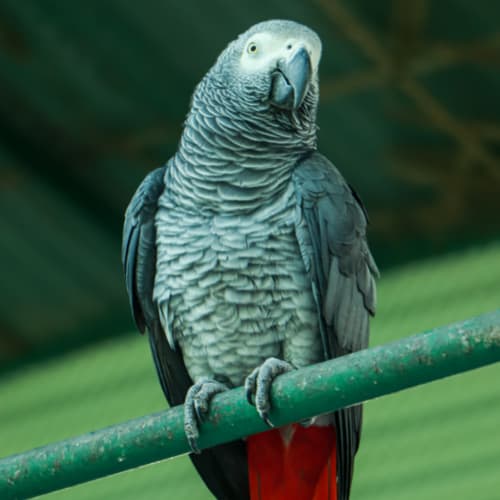
African grey parrots originate in central African rainforests, with two main subspecies - the Congo and Timneh African greys. They live in canopy areas in large flocks. African greys exhibit an innate vocal mimicry ability from a very young age, which allows them to imitate novel sounds in their environment.
The African grey is considered one of the most intelligent parrot species. Their large brains, flexible behavior and social nature contribute to their advanced cognitive and communication skills. Among parrots, African greys excel at reproducing human words, songs, and noises with exceptional accuracy. This makes them very popular pets, although quite expensive to acquire and care for long-term, as explored further in this African grey parrot price guide.
To sum up, African greys possess innate mimicry skills and intelligence that enable their famed ability to mimic human speech when exposed to it. The origins of their impressive cognitive capacities remain scientifically unresolved.
Documented Examples of Advanced Vocal Skills
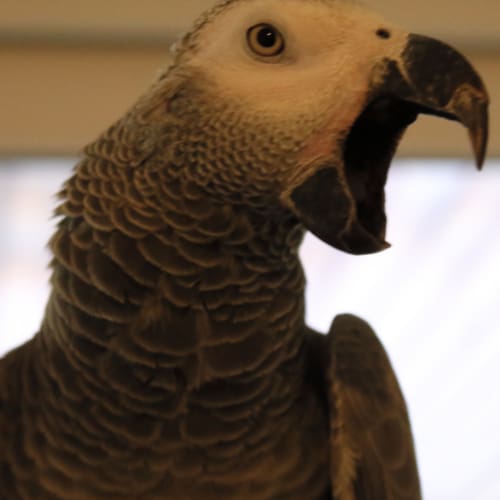
While many parrots can mimic human speech to some degree, African greys stand out for their exceptional vocal mimicry abilities. Some individual greys have become famous for their large vocabularies and seemingly contextual use of language.
African greys are renowned for their impressive capacity to learn words and phrases. As explored in more depth in this article on how many words can an African grey parrot learn, some individual greys have amassed vocabularies of over 1,000 words through dedicated training. Even typical pet greys pick up a few hundred words or more. This exceptional verbal ability is what sets greys apart from other parrot species.
Famous Talking African Greys
Several African greys have gained notoriety for their extensive vocabularies and vocal skills:
- Alex: Owned by animal psychologist Irene Pepperberg, Alex demonstrated over 100 words and could identify 50 different objects. He combined words into phrases like "come here" and "wanna go back".
- N'kisi: Reportedly used over 1000 words and made simple sentences like "N'kisi love shower" and "Want tea". N'kisi showed creativity by inventing phrases like "pretty smell medicine" for flowers.
- Einstein: Owned by trainer Stephanie White, Einstein was said to know over 1000 words. A 2011 study found strong evidence he could mimic novel sounds.
- Cosmo: Appeared on TV shows for his 900-word vocabulary. He could answer complex questions like "What color key opens the blue box?"
Contextual Language Use
In some instances, African greys seem capable of using words appropriately depending on context. Some instances include:
- Using "no" to refuse undesired objects or actions
- Uttering known phrases in correct situations ("Hi Stephanie" when owner arrives)
- Answering simple questions about shapes, colors, or other attributes
- Applying labels like "nut" or "seed" to the correct foods when asked
Combining Words and Phrases
While lacking true grammar, some African greys can combine words in logical order.
They are capable of stringing 2-3 word phrases together like "Come here", "Wanna nut", "Go back room". They can also mix learned words and novel vocalizations to make new phrases and use words in sensible sequences to appear as full sentences ("Stephanie give treat").
Large Vocabularies
The largest reported African grey vocabularies exceed 1000 words, greater than any other animals (like chimps). However, most greys master only a couple hundred words at most. Factors impacting vocabulary size include:
- The amount of social interaction with humans
- Active engagement and training by owners
- Mental stimulation and language exposure
- Potentially innate individual differences
While African greys clearly lack true language, the most advanced individuals display vocal skills and mimicry that appear remarkably human-like. However, their ability to use words meaningfully remains controversial.
Understanding vs. Mimicry: The Current Scientific Debate
While African greys show impressive vocal mimicry skills, the extent to which they actually comprehend language remains hotly debated in the scientific community. Researchers clash over the implications of their advanced mimicking abilities.
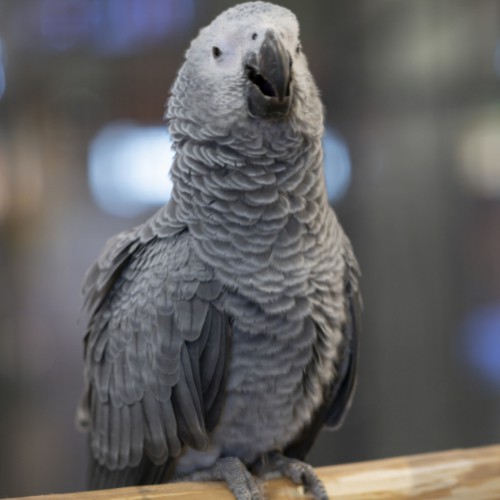
The Difference Between Mimicry and Comprehension
Mimicry involves reproducing sounds without real meaning attached. Comprehension requires understanding concepts, meanings, and the relationships between words. Some key differences include:
- Mimicry - Imitating speech sounds; being able to repeat words.
- Comprehension - Grasping meanings behind words and responding appropriately.
- Relating words correctly to objects, actions and attributes.
Conflicting Perspectives Among Researchers
Scientists disagree on whether African greys' cognitive capacities enable true comprehension:
Skeptics claim that their skills are just excellent mimicry, not human-like language. On the other hand, supporters managed to provide evidence showing they grasp some semantics and syntax, while some middle-ground researchers maintain that Greys have limited comprehension of meanings but lack syntax and grammar.
Review of Key Cognitive Studies
Research on African greys has yielded conflicting results:
- Labeling studies: Some show correct object labeling, while others claim that it might be accidental.
- Brain imaging reveals advanced vocal learning regions, but there are differences in key language areas.
- Cognition tests demonstrate complex thinking, but limitations in communication are observed.
- Context usage: Examples of meaningful use exist but may lack true understanding.
Challenges in Conclusively Demonstrating Comprehension
Factors complicating proof of real language skills are still dividing the scientific community to this day. Some of these include the lack of real syntax/grammar, inability for fluid conversation, potentially inflexible vocabulary usage, and differences in human vs parrot neurobiology.
So, while African greys show remarkable vocal mimicry talents, the scientific community remains divided on claims of true language comprehension. More research is needed to better elucidate the bounds of their cognitive capabilities.
Evidence For and Against Language Comprehension
The debate around African greys' linguistic abilities hinges on evidence from both sides implying some level of comprehension, countered by clear cognitive limitations.

Observations Suggesting Comprehension
Some examples of African greys appearing to demonstrate comprehensioninclude:
- Using words in meaningful, context-specific ways.
- Applying labels accurately to objects.
- Responding appropriately to simple commands or questions.
- Creating logical two to three-word phrases.
- Answering questions about attributes like shape, color, etc.
Examples of Apparent Meaningful Use
Individual African greys seem to meaningfully use words, as displayed by the following instances:
- Alex the parrot could label key attributes of objects he was shown.
- An African grey named Griffin reportedly greeted family members by name when they entered the room.
- A study found African greys learned object labels as quickly as a 3-4-year-old.
Counter Evidence Against True Comprehension
Clear cognitive limitations also exist; examples of these are listed below:
- Lack of real syntax or grammar.
- Inability to engage in complex, fluid conversations.
- Heavy dependence on rote mimicry to construct sentences.
- Failure to extrapolate words to novel situations or objects.
- Difficulty grasping abstract concepts beyond the concrete.
Constraints Imposed by Neurobiology Differences
Parrot brains differ significantly from primate brains; they have limited frontal cortex development - the key area for cognition. Parrots also display specialized connectivity for mimicking sounds, but differences in language circuits still exist. They are also incapable of human-level vocal control.
Overall, while African greys appear capable of limited comprehension, their cognitive architecture likely restricts language skills relative to humans. More research is needed to understand the nuances of their abilities.
Teaching African Greys: Implications for Owners
Proper socialization and training are critical for African grey parrots to reach their vocal mimicry potential. However, owners should balance stimulating communication abilities while maintaining realistic expectations.
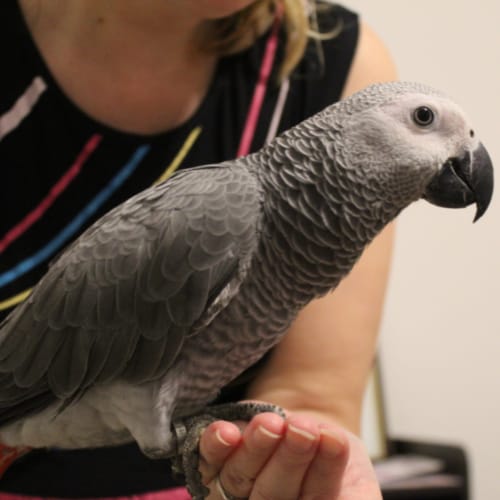
Effects of Social Interaction on Language Skills
Regular human interaction helps develop strong mimicry skills. Frequent conversational exchanges expose birds to more vocabulary, and forming bonds with owners provides motivation to imitate speech. Realistically, a socially isolated African grey may never learn to "talk".
Effective Training Techniques
Useful strategies for teaching vocabulary include the following:
- Repeat words clearly and consistently associated with objects or actions.
- positively reinforce successful mimicry attempts with treats and praise.
- Avoid overly correcting mistakes - stay relaxed and patient.
- Use daily short sessions focused on a few new words. In addition, providing quality toys and accessories give mental enrichment and can motivate vocal practice.
Potential for Limited Two-Way Communication
With diligent training, some conversational ability may emerge, and your African Grey will be able to:
- Answer simple questions about colors, shapes, etc.
- Provide appropriate, limited responses to common owner statements.
- Follow basic commands like "come here" or "go back".
- Greet known individuals with learned phrases.
However, fluid dialog similar to human conversation remains impossible.
Ethical Considerations
Complex cognitive stimulation risks anthropomorphizing birds. Setting unrealistic expectations may frustrate both owners and pets. Remain mindful of the innate behaviors and needs of African greys first and foremost, the differences between human and parrot cognition and Avoid overly ambitious language training programs.
With a thoughtful approach, African greys can develop impressive mimicry skills benefiting both people and parrots. Still, comprehension will remain limited.
Frequently Asked Questions
The following are some frequently asked questions that we compiled to help you better understand the topic of African Greys' talking abilities and whether they understand what they say. The information will help you form a personal conclusion, as scientists are still divided on this topic.
How large of a vocabulary can African greys learn?
The largest reported African grey vocabularies exceed 1,000 words, but most greys master only a couple hundred words. Vocabulary size depends on social interaction, training, and the individual bird.
Can African greys really use language contextually?
There are examples of greys using words contextually, like labeling objects correctly. However, their skills are limited without true grammar or abstract language.
Are there examples of African greys engaging in two-way communication?
African greys have shown limited two-way communicative ability, like answering simple questions or appropriately responding to owner statements. Complex dialogue, however, is beyond their capacity.
Do African greys understand the human speech they mimic?
This remains debated. Some evidence points to limited comprehension of meanings, but clear cognitive constraints exist. They likely do not process language the way humans do.
How can owners best communicate with their African greys?
Using consistent vocabulary, rewards for successful mimicry, simple questions/commands related to the bird's world, but avoiding overly advanced language training can all help better communicate with your African Grey.
How do African greys compare to other parrot species in terms of intelligence and speech?
African greys are considered among the most intelligent parrot species, with the clearest speech mimicry abilities, but other advanced parrots like macaws can also "talk".
Why can't researchers definitively determine if African greys understand language?
Clear limitations exist, but designed experiments can have flaws. Controlled studies without cuing biases are needed to separate mimicry from comprehension.
Final Thoughts
The remarkable mimicry and vocalizations of African grey parrots fuel myths about advanced human-like language skills. However, scientifically evaluating their abilities paints a more nuanced picture. While some individuals demonstrate large vocabularies used contextually, clear limitations exist, including lack of true grammar, conversation, and abstract reasoning.
Current evidence suggests greys show limited comprehension, tied to physical objects and actions. Claims of near-human cognition lack rigorous support. More controlled studies are needed to clarify how African greys acquire and understand vocabulary. Examining neurobiological differences from humans and primates may further explain the vocal capacities of parrots. Though fascinating mimics, interpreting African greys through a human lens likely overestimates their skills.
If you have more questions or comments, feel free to contact us.
Thanks for reading!


